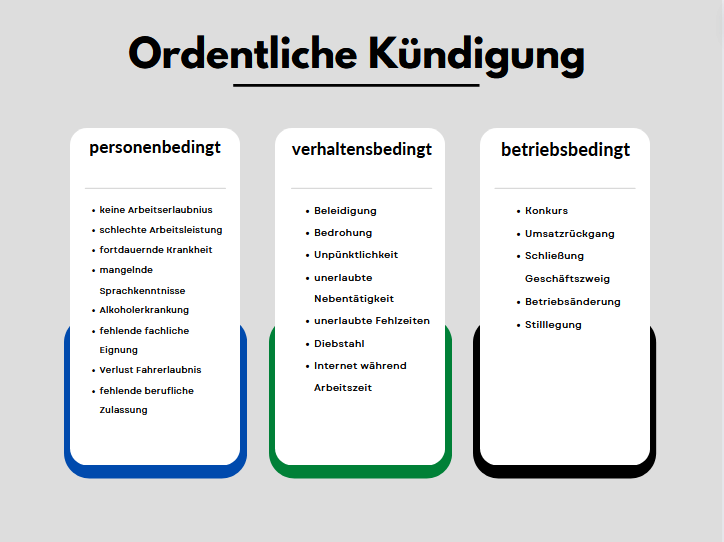Schleswig-Holstein Regional Labour Court, 08.10.15, Ref.: 5 Sa 176/15
Labour law issues relating to company vehicles and their use always arise when an employee uses a vehicle provided by the employer in the course of their normal work and intentionally or negligently violates the road traffic regulations.
In the case discussed here, the Schleswig-Holstein Regional Labour Court had to decide whether an employee could be dismissed without notice because he had repeatedly violated the road traffic regulations.

Facts of the Case:
Plaintiff was employed by the nursing service as an outpatient assistant
The 31-year-old plaintiff had been employed as a carer by the defendant, an outpatient care service, since 1 November 2013. The plaintiff used a company car to carry out her care work.
On 9 January 2015, the plaintiff was driving at excessive speed on the way to a patient and turned off without indicating, thereby taking the right of way from another oncoming road user. In doing so, the plaintiff committed an offence of endangering road traffic pursuant to Section 315 c (1) no. 2 StGB.
Plaintiff gives way to another road user while on duty, cancellation
When the defendant later confronted the plaintiff with the accusation, the plaintiff did not show any understanding. The plaintiff had already culpably hit a cyclist with a car on 16 August 2014 and had driven the company car into a wall on 29 October 2014, causing material damage to the company car.
In a letter dated 19 January 2015, the plaintiff then terminated the employment relationship in due time with effect from 28 February 2015 and again in a letter dated 22 January 2015 without notice, alternatively in due time.
Plaintiff filed suit, labour court ordered nursing service to continue employment
On 2 February 2015, the plaintiff then filed an action for unfair dismissal. In her defence, the defendant argued in the proceedings that there was good cause for termination without notice. It was unreasonable for the defendant to expect other road users to be endangered by the plaintiff's business trips. The labour court that was initially called upon upheld the action in full in its ruling of 29 April 2015 and ruled that the employment relationship between the parties had not been terminated by the defendant's termination without notice on 19 January 2015.
The defendant lodged an appeal against this with the Schleswig-Holstein Regional Labour Court.
Appeal judgement of the Schleswig-Holstein Regional Labour Court
LAG confirms judgement of the labour court
The LAG Schleswig-Holstein has now ruled that the labour court was right to uphold the action for unfair dismissal. The conditions for dismissal without notice had not been met, meaning that the employment relationship had not already ended without notice upon receipt of the contested dismissal on 22 January 2015.
According to Section 626 (1) BGB, the employment relationship can be terminated for good cause without observing a notice period if there are facts on the basis of which the terminating party cannot reasonably be expected to continue the employment relationship until the end of the notice period, taking into account all the circumstances of the individual case and weighing up the interests of both parties to the contract. The legal review in accordance with Section 626 (1) BGB takes place in two stages: Firstly, there must be a reason which - without taking into account the special circumstances of the individual case - is in itself suitable to justify extraordinary termination.
On the other hand, this reason must outweigh the legitimate interests of the terminating party in terminating the employment relationship without notice, taking into account all circumstances of the individual case, in particular the principle of proportionality.
Termination without notice was disproportionate
Measured against this, the termination without notice was disproportionate in the present case.
It is true that endangering road traffic in accordance with Section 315c (1) (2a) of the German Criminal Code (StGB) by the employee in the course of carrying out his contractually owed work with the employer's company vehicle could constitute good cause for termination without notice. This is because an employee travelling on business in a company vehicle must of course comply with the road traffic regulations. He owes this not only to the legal system and the general public, but also - as a secondary contractual obligation - to the employer.
However, the extraordinary termination failed in the present case due to the necessary balancing of interests.
The breach of duty with which the plaintiff was charged clearly belonged to the area of performance (poor or improper business travel) and it was not a criminal offence that was explicitly directed against the defendant as employer (e.g. theft, embezzlement, damage to property, bodily harm, insult).
There were no reasons not to wait for the ordinary notice period
The defendant fails to recognise that termination without notice can only ever be the last resort in response to an employee's breach of duty. As a rule, in the event of poor performance, the ordinary cancellation be. The defendant had also not demonstrated any circumstances why it should exceptionally have been unreasonable for it to continue to employ the plaintiff for a good month until the expiry of the ordinary notice period of the plaintiff's previously given notice of termination.
Furthermore, the defendant fails to recognise that, according to the principle of proportionality, dismissal without notice must always be the last resort in response to a breach of contract. Moreover, if the breach of contract is based on controllable behaviour on the part of the employee, it can generally be assumed that his future behaviour can be positively influenced by the threat of consequences for the continuation of the employment relationship.
In addition, a warning should have been issued beforehand
One Warning letter According to the principle of proportionality, which is also expressed in Section 314 (2) BGB in conjunction with Section 323 (2) BGB, a warning is only not required if it is already apparent ex ante that a change in behaviour cannot be expected in the future, even after a warning, or if the breach of duty is so serious that even accepting it for the first time is unreasonable for the employer according to objective standards and therefore obviously impossible for the employee.
Even in the case of a termination without notice or ordinary termination for behavioural reasons, the principle of a negative prognosis applies in termination law. A dismissal is not a punishment for breaches of contract committed, but is only justified if the employer must also expect similar breaches of contract in the future and therefore cannot reasonably be expected to continue the employment relationship with the employee. Based on this, the plaintiff should first have been warned for her behaviour in breach of the contract. This applies in particular in view of the fact that the incident in dispute had indisputably remained without consequences. The alleged infringement of right of way had neither led to a traffic accident nor to investigation proceedings in which the defendant would have been involved as the vehicle owner, nor to a driving ban or withdrawal of driving licence at the expense of the plaintiff, nor to material damage to the defendant's company vehicle.
Source: Schleswig-Holstein Regional Labour Court
Important Note: The content of this article has been prepared to the best of our knowledge and belief. However, due to the complexity and constant evolution of the subject matter, we must exclude liability and warranty. Important Notice: The content of this article has been created to the best of our knowledge and understanding. However, due to the complexity and constant changes in the subject matter, we must exclude any liability and warranty.
If you need legal advice, feel free to call us at 0221 – 80187670 or email us at info@mth-partner.de.




